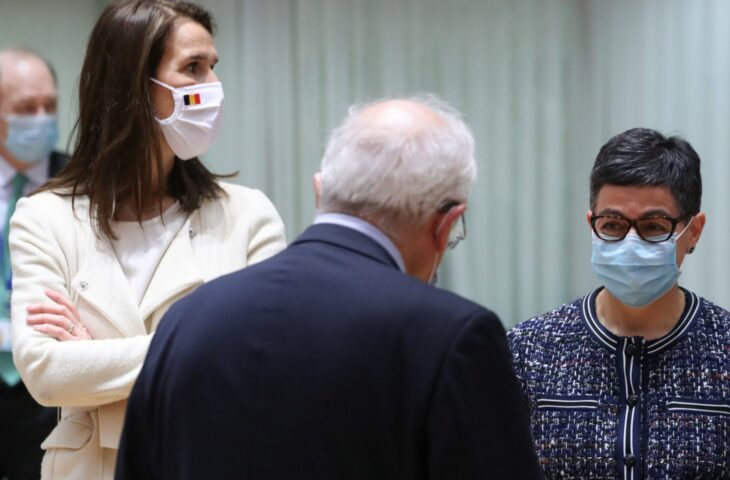Political decision clears the way for new punitive measures over the jailing of opposition leader Alexei Navalny.

EU foreign ministers agreed Monday to impose new sanctions on Russia over the jailing of opposition leader Alexei Navalny, diplomats said.
The decision, taken at a meeting in Brussels, clears the way for more detailed work on the precise targets of new penalties but diplomats said they expected at least four officials to be hit, possibly including Russia’s prosecutor general, Igor Krasnov, and the head of its federal prisons service, Alexander Kalashnikov.
Some EU countries have called for new sanctions since Navalny was arrested last month upon his return to Russia from Germany, where he had been treated following an assassination attempt in August, in which he was poisoned with a military-grade nerve agent while traveling in Siberia. He was accused of violating parole in a previous case in which he had received a suspended sentence on politically trumped-up fraud charges. — the European Court of Human Rights has condemned both the original fraud prosecution and Navalny’s recent sentencing to more than two years in prison for the parole violation.
Monday’s decision on sanctions was widely expected after a disastrous visit to Moscow by the EU’s foreign policy chief, Josep Borrell, during which Russia expelled three diplomats from EU countries for allegedly attending demonstrations in support of Navalny. The expulsions were part of a broader effort by Russian Foreign Minister Sergey Lavrov to humiliate Borrell, who traveled to Moscow saying he hoped to reopen dialogue with the Kremlin.
One participant in Monday’s Foreign Affairs Council meeting said that Polish Foreign Minister Zbigniew Rau had made a forceful case for new punitive measures, noting that Russia had consistently demonstrated that it was not interested in mutually beneficial cooperation with the EU.
Rau stressed that the persecution of Navalny and other political opposition figures, as well as arrests of thousands of demonstrators in recent weeks, should be met with an “adequate response” from Brussels.
At a news conference following the meeting of foreign ministers, Borrell said the EU was united in its approach toward Russia, but at times he sounded as if tensions with Moscow had begun only recently and not been simmering at least since the invasion and annexation of Crimea in 2014.
“There is a shared assessment in the Council that Russia is drifting towards an authoritarian state and driving away from Europe,” Borrell said, adding apparently in reference to his recent trip: “The ministers unanimously interpreted Russia’s recent actions and responses as a clear signal of not being interested in cooperation with the European Union, quite the contrary, [it] looks interested in confrontation and disengagement from the European Union.”
Borrell said the EU would have a three-pronged approach — “to push back when [Russia] infringes international law and human rights,” “to contain when it seeks to increase its pressure on us, including through disinformation and cyber-attacks” and “to engage when and on issues where we have an interest in doing so.”
On sanctions related to Navalny’s jailing, Borrell refused to confirm any details about potential individuals who will be targeted by the new measures, but said the penalties would be brought “against those responsible for his arrest, and sentencing and prosecution.” To impose the measures, Borrell said the EU would use a new framework for sanctions against human rights violators, approved in December. He said administrative steps would begin immediately and the specific sanctions could be formally approved in about a week.
By focusing narrowly on those responsible for Navalny’s incarceration, the EU risks ignoring a broader political context, in which Navalny’s allies say the Kremlin is working to eliminate competition in national parliamentary elections later this year.
Navalny and his close associates have called on Brussels to sanction oligarchs close to Vladimir Putin who have substantial assets in the West, but such a move presents potential legal complications. Two of Navalny’s top lieutenants, Leonid Volkov and Ivan Zhdanov, met with EU diplomats on Sunday to press for targeting the oligarchs.
In an interview with Die Welt before Monday’s decision was taken, Russia’s ambassador to the EU, Vladimir Chizhov, said Moscow would be ready to respond to any new punitive measures. “I am not going to speculate whether our partners will go for another round of illegitimate unilateral restrictive measures against my country,” Chizhov said in the interview. “When and if that happens, we will be ready to respond.”
This article has been updated.




